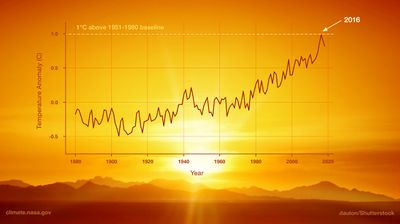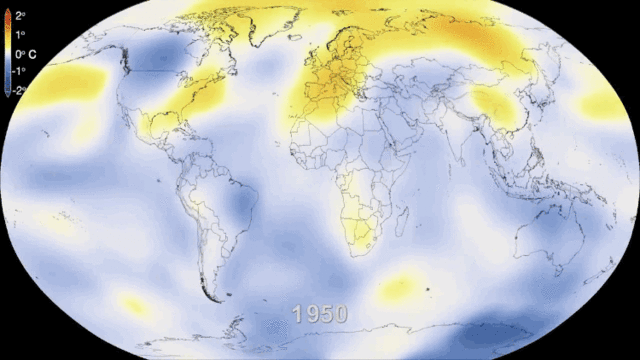Global warming: Difference between revisions
m (1 revision imported) |
Energy>Jmdonev No edit summary |
||
| Line 1: | Line 1: | ||
[[Category:Done | [[Category:Done 2020-01-31]] [[Category:Uploaded]] | ||
<onlyinclude>Global warming refers to the [[anthropogenic]] warming of the planet. This warming comes from intensifying the [[greenhouse effect]], an effect that exists on [[Greenhouse effect on other planets|many other planets]] and has existed on Earth for almost as long as the planet has.<ref name = oxford>Jelley., Dictionary of Energy Science: Oxford University Press</ref> When used in conversation, climate change and global warming are sometimes used interchangeably, as there's no difference. It is more accurate to say that global warming is ''one of the many signs'' of | [[File:nasa global warming.jpeg|400px|thumb|right|Figure 1. 136 years of changing global surface temperatures. <ref>Both the data and the image are from NASA's Global Climate Change website, downloaded from https://climate.nasa.gov/resources/global-warming-vs-climate-change/ on October 24th, 2019.</ref>]] | ||
<onlyinclude>Global warming refers to the [[anthropogenic]] warming of the planet. This warming comes from intensifying the [[greenhouse effect]], an effect that exists on [[Greenhouse effect on other planets|many other planets]] and has existed on Earth for almost as long as the planet has.<ref name = oxford>Jelley., Dictionary of Energy Science: Oxford University Press</ref> When used in conversation, climate change and global warming are sometimes used interchangeably, as if there's no difference. However, global warming refers to the ''anthropogenic'' warming of the Earth's climate, over a long period of time, whereas [[climate change]] includes both natural and manmade causes. It is more accurate to say that global warming is ''one of the many signs'' of climate change.</onlyinclude> | |||
The planet is certainly warmer than it would be without the greenhouse effect, see [[Earth Temperature without GHGs|here]] for details. The [[temperature of the Earth]] has been going up in recent decades (see figure 1), and this warming will cause an increasing number of problems for people around the world in the decades to come. | The planet is certainly warmer than it would be without the greenhouse effect, see [[Earth Temperature without GHGs|here]] for details. The [[temperature of the Earth]] has been going up in recent decades (see figure 1), and this warming will cause an increasing number of problems for people around the world in the decades to come. | ||
[[File:climate-change-33.gif|900px|thumb|center|Figure | [[File:climate-change-33.gif|900px|thumb|center|Figure 2. Sixty years of global warming.<ref>While these data are from NASA, this image was downloaded from http://bgr.com/2014/01/29/global-warming-gif-video/ on September 4th, 2015.</ref>]] | ||
Global warming is only one of many problems caused by [[climate change]]. At the moment, many of the consequences of global warming have been relatively benign, and sometimes even beneficial, but as global warming intensifies the consequences will keep getting worse. | Global warming is only one of many problems caused by [[climate change]]. At the moment, many of the consequences of global warming have been relatively benign, and sometimes even beneficial, but as global warming intensifies the consequences will keep getting worse. | ||
| Line 17: | Line 18: | ||
Humans use [[energy]] to maintain a [[high energy society]] that provides a good [[quality of life]]. This means the amount of energy that people use keeps increasing (see the pages on the [[BRIC]] and [[N11 countries]] for great examples of this). Unfortunately, most of the world's [[primary energy]] comes from [[fossil fuel]]s, which is why climate change is so hard to stop. | Humans use [[energy]] to maintain a [[high energy society]] that provides a good [[quality of life]]. As the world becomes more developed, the demand for [[energy service]]s increases worldwide, and the demand for energy goes up as well. This means the amount of energy that people use keeps increasing (see the pages on the [[BRIC]] and [[N11 countries]] for great examples of this). Unfortunately, most of the world's [[primary energy]] comes from [[fossil fuel]]s, which is why climate change is so hard to stop. | ||
There are [[Reserve vs occurrence|lots of fossil fuels left]]. In fact, the biggest problem the world is facing | There are [[Reserve vs occurrence|lots of fossil fuels left]]. In fact, the biggest problem the world is facing is that fossil fuels ''aren't'' going to run out anytime soon! We have enough to continue burning these fuels for decades to come. However, it will continue to induce problematic global warming, and climate change in general. | ||
==For Further Reading== | ==For Further Reading== | ||
Revision as of 20:31, 19 January 2020

Global warming refers to the anthropogenic warming of the planet. This warming comes from intensifying the greenhouse effect, an effect that exists on many other planets and has existed on Earth for almost as long as the planet has.[2] When used in conversation, climate change and global warming are sometimes used interchangeably, as if there's no difference. However, global warming refers to the anthropogenic warming of the Earth's climate, over a long period of time, whereas climate change includes both natural and manmade causes. It is more accurate to say that global warming is one of the many signs of climate change.
The planet is certainly warmer than it would be without the greenhouse effect, see here for details. The temperature of the Earth has been going up in recent decades (see figure 1), and this warming will cause an increasing number of problems for people around the world in the decades to come.

Global warming is only one of many problems caused by climate change. At the moment, many of the consequences of global warming have been relatively benign, and sometimes even beneficial, but as global warming intensifies the consequences will keep getting worse.
Global warming is:
- Happening, here are 10 indicators of a warming world
- Human caused (anthropogenic)
- Humans "push the climate" which is known as climate forcing
- A direct result of our hydrocarbon combustion
- Already happening: see how our oceans are getting warmer, and their levels are rising.
- Going to be bad for everyone on the planet, but worse for some than others.
Humans use energy to maintain a high energy society that provides a good quality of life. As the world becomes more developed, the demand for energy services increases worldwide, and the demand for energy goes up as well. This means the amount of energy that people use keeps increasing (see the pages on the BRIC and N11 countries for great examples of this). Unfortunately, most of the world's primary energy comes from fossil fuels, which is why climate change is so hard to stop.
There are lots of fossil fuels left. In fact, the biggest problem the world is facing is that fossil fuels aren't going to run out anytime soon! We have enough to continue burning these fuels for decades to come. However, it will continue to induce problematic global warming, and climate change in general.
For Further Reading
- Climate change
- Climate forcing
- Indicators of a warming world
- Renewable and sustainable energy
- Or explore a random page
References
- ↑ Both the data and the image are from NASA's Global Climate Change website, downloaded from https://climate.nasa.gov/resources/global-warming-vs-climate-change/ on October 24th, 2019.
- ↑ Jelley., Dictionary of Energy Science: Oxford University Press
- ↑ While these data are from NASA, this image was downloaded from http://bgr.com/2014/01/29/global-warming-gif-video/ on September 4th, 2015.

